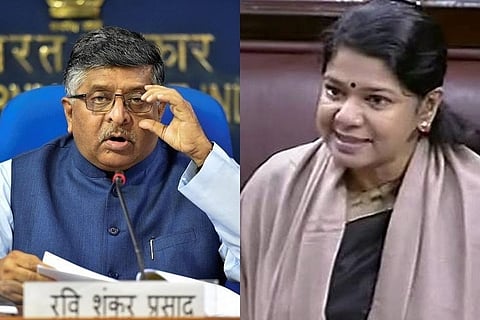

In an unstarred question, DMK MP Kanimozhi on Wednesday asked Law Minister Ravi Shankar Prasad a pertinent question. She asked if the government has taken any steps to consult major political parties and other stakeholders on the Women’s Reservation Bill. She also asked if the government has taken any steps to bring the Bill to Parliament and if not, why.
Ravi Shankar Prasad’s response however, was at best vague. Sidestepping giving a direct answer, he said that the government considered gender justice important, and the matter needed “careful consideration” based on consensus among political parties.
“Gender justice is an important commitment of the Government. The issue involved needs careful consideration on the basis of the consensus among all political parties before a Bill for amendment in the Constitution is brought before Parliament,” his response read.
Before the 2019 Lok Sabha elections, Rahul Gandhi, then Congress President, had said that his party would ensure 33% seats reservation in government posts and legislatures if the Congress came to power. He had also said that his part would take steps to pass the Women’s Reservation Bill. Over time, many MPs have expressed support for the Bill. Shakti (a non-partisan inclusive collective of women who have joined hands across region, caste, creed, and ideology) that did a ‘Call Your MP’ campaign in December 2018, said it got support from 126 MPs for the Bill, including BJP’s Meenakshi Lekhi and Kerala CPI(M)’s PK Sreemathi.
The Law Minister’s response comes despite several efforts by women, and organisations like Shakti, to push for the Bill to be tabled in the Parliament.
The Women’s Reservation Bill aims to reserve 33% seats for women in the Lok Sabha and State Legislative Assemblies. Of these, 1/3rd seats will be reserved for women from Scheduled Castes and Scheduled Tribes. The reservation will happen on a rotational basis – meaning different constituencies in states or Union Territories will have reservations under this Bill every general election. The reservations will apply for 15 years after the Bill becomes a law.
The Women’s Reservation Bill was first introduced in the Parliament in 1996, and several times after that. The present version of the Bill was passed in the Rajya Sabha in 2010. However, since the Lok Sabha did not vote on it, it lapsed when the 15th Lok Sabha dissolved in 2014. However, it can be reintroduced in the Lok Sabha whenever the government wants.
Watch: